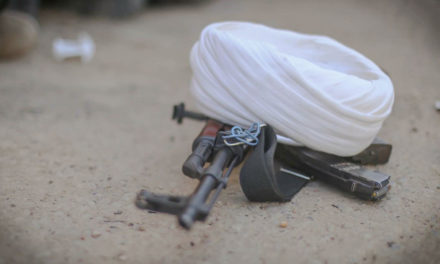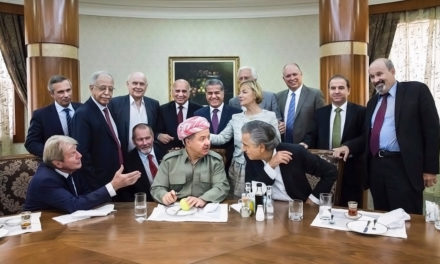Analyses, in both Western and Arab discourses, of Iraq’s ongoing protests against corruption and ‘sectarian quotas’ tend to be inflected with an elite-sectarian framework. This framework foregrounds sect-based identities and their manipulation by elite actors and institutions in its explanations of these mobilisations. Consequently, political protest in Iraq is rarely seen as indicative of participatory, integrative and democratic practice; but rather as a performative dimension of elite power struggles (in this case within the broad Shi’i political bloc). These protests, it is argued, are a Shi’i phenomenon called into being and directed by Muqtada al-Sadr as part of a political strategy within this elite-level struggle for power.[1] Without denying the relevance of such factors, it is possible to consider what is crowded out of our understanding as a result of this narrow focus. Most obvious is the role of Iraqi civil society, activists, and the Iraqi public sphere, all of which have played a part in the protest movement that is rarely recognised or commented upon. This neglect reflects a characteristic oversight in much Iraq scholarship and analysis, as the Iraq scholar Eric Davis has argued:
‘The notion of the public sphere [in Iraq] has not been conceptually visible because most analyses of Iraqi politics have focused on the behavior of political elites. The lack of focus on nonelite dimensions of Iraqi politics [has] tended to obscure the efforts to reconstitute a functioning civil society following the collapse of Saddam Husayn’s Ba‘thist regime in 2003.’[2]
This article intends to shed light on some of these neglected dimensions of the protest movement through an analysis of one of the key figures in the civil trend’s cooperation with the Sadrists in ongoing political activism in Iraq: the Iraqi poet, journalist, and activist, Ahmad Abd al-Hussein.
Background: Iraq’s reform protest movement
Iraq’s political establishment has come under considerable pressure from a long-running protest movement demanding fundamental political reform. One Iraqi analyst has described this movement as: ‘the first large-scale popular challenge to the consensus on the Iraqi political system after US occupation.’[3] The consensus referred to here is what is termed in Iraqi political discourse as the system of ‘sectarian quotas’ and the proposed solution is a shift towards technocratic appointments which they argue would help combat corruption and improve institutional effectiveness.
The origins of this trend can be traced back to a protest initiated in August 2014 by various civil society organisations who labelled their campaign ‘ministries without quotas’. The campaign focused on the demand of extracting four ministries (Education; Higher Education; Culture; and Youth and Sport) from the mechanism of ‘sectarian and ethnic quotas’, and installing qualified ‘technocrats’ to lead these ministries. At the time this movement began, some Iraqi commentators considered the civil society trend to be fairly impotent, unable to affect the sclerotic Iraqi political system. Since then, the demands and vocabulary of this movement have become the dominant themes of Iraqi politics, and other political actors have developed political strategies which utilise, or exploit, this reform narrative (including PM al-Abadi, the Sadrist trend, the opposition ‘Reform Front’, and even the political wings of some of the hashd militant groups such as Asa’ib Ahl al-Haq.)
Civil trend – Sadrist cooperation and tensions
The protest movement was transformed by the participation of the Sadrist trend. On the one hand, the Sadrists swelled the ranks of the protesters ranks leading to huge demonstrations in Baghdad’s Tahrir Square, the repeated storming of the Green Zone, and the withdrawal of Sadr’s Ahrar bloc from parliament, all of which brought considerable pressure to bear on the Iraqi political establishment. Some elements within the civil trend have thus welcomed and embraced Sadrist participation. On the other hand, many in the civil trend, who regard the Sadrists as themselves part of the political establishment, and consider the political values and objectives of the Islamist movement as fundamentally incompatible with those of the civil trend, saw cooperation with the Sadrists as a moral and strategic failure. The Iraqi intellectual Sinan Antoon summed up this sentiment, writing: ‘Perhaps the latest example of the haphazardness of those who talk in the name of the ‘civil society trend’ is the disintegration of efforts to justify their alliance’s joint appearance with the Sadrist trend. For the Sadrists represent a part of the political process that delivered the country into the ruin which it is currently drowning in.’
This division within the civil trend is manifest in the divergence between two groups. Mustamerroun (whose key figures include the poet Ahmad Abd al-Hussein, the communist political figure Jassim al-Halfi, and the film director Mohammed Daraji) continued and expanded their cooperation with the Sadrist trend, operating through the Higher Coordination Committee for the Coordination of Protests in Iraq, in which Hassan al-Kaabi acts as representative and go-between for the Sadrist trend. By contrast, the recently established the Madaniyoun group represents activists who reject cooperation with any political entity, including the Sadrists, and have criticised the latter for attempting to use the civil trend as a ‘front’ for parochial political purposes and as not being serious about implementing reforms. Madainyoun has argued that the cooperation with the Sadrists has seen the civil trend ‘deviate’ from its proper path and head towards irrelevance.[4]

Recent meeting between Ahmad and Muqtada al-Sadr
Ahmad Abd al-Hussein: Understanding cooperation with the Sadrist trend
Secular/Leftist-Islamist interaction in political activism is a well-documented phenomenon. Intellectual interpenetration has been a major feature of the development of political Islam in the 20th century. Leftist intellectual currents and strategies of political action (including Marxist trends, Heidegger, Sartre, Fanon etc.) have been influential in both Sunni and Shi’i Islamism. Notable examples include: the Muslim Brotherhood in Syria and Egypt;[5] the sahwa islamiya in Saudi Arabia;[6] the jama’at-e-islami in Pakistan;[7] Ali Shariati’s ‘Red Shiism’; and Mohammed Baqir al-Sadr’s ‘vocal hawza’ in Iraq.[8] However, this intellectual influence did not preclude intense political struggle between leftist and Islamist forces. In fact, this struggle was often rendered more fierce precisely because of this intellectual proximity, both sides were competing for influence within the same constituencies and deploying similar symbolic and conceptual forms. In Iraq, for example, Baqir al-Sadr’s religio-political project was designed precisely to arrest the erosion of the Shi’i mujtahids’ social, political and economic bases which were, at that time, being overrun by Shi’i participation in socialist and communist politics. Secular-Islamist cooperation in political activism has also been apparent at particular historical junctures, notable examples being the 1979 Iranian Revolution, and the prelude to the overthrow of Mubarak in Egypt in 2011. However, such episodes tend to be discrete periods of tactical cooperation during times of total contestation of the political field. Secular-Islamist cooperation, whether tacit or coordinated, quickly reverted to polarisation when the object of political struggle was successfully obtained and participants began to engage in the consolidation of a new political arena.
Iraq’s protest movement is not engaged in a total contestation of the political field, but is, rather, attempting to attain specific political goals within the existing constitutional framework. Secular-Islamist cooperation in this context is therefore distinct from previous episodes of tacit or instrumental cooperation in periods of total contestation. The story of Ahmad Abd al-Hussein suggests the possibility, in the current Iraqi context, of a secular-Islamist cooperation which reaches beyond purely tactical or instrumental dimensions, coordinated at an elite level, and points toward a deeper and more interesting engagement between the two sides.
The course of Ahmad Abd al-Hussein’s life leaves him perhaps uniquely placed to mediate between the secular and Sadrist trends. For him, the Sadrists are not an alien other, an irrational and easily manipulated sectarian-religious mob of lower-class slum dwellers (as they are so often portrayed in Western analyses and Iraqi intellectual discourse). Rather, he engages with them directly with dignity and as equals, he feels a genuine affinity with the Sadrists, as he wrote in a recent message titled ‘To my Sadrist friends’: ‘I know your good inner character, the clay from which you have been moulded. So I address you as your brother.’[9] This is more than mere rhetoric, since Ahmad is himself a son of Sadr City, or al-thawra city (Revolution City) as it was prior to 2003.
Ahmad was born in what is now Sadr City, the product of Iraq’s rapid urbanisation, in 1966. His father was lost when Ahmad was 14, but as a man of religion, he made an indelible mark on his son. Ahmad has described how his father left him a small library with many religious texts which became a space through which he gained an intellectual vantage point on the world without. Ahmad’s father and older brother were also both poets and it was this path that Ahmad would follow from an early age stating that: ‘Perhaps had I been in a house with a piano, or tools for painting, I would have been a different person. I became a poet because it was all that was available, the poorest art form is chosen by the poorest people.’[10] Ahmad found immediate success through poetry, he recalled: ‘I sent a poem to the literary magazine at-talayia (Avant-Garde) in 1983, and it was published when I was still only 17 years old. Publication in at-talayia was my passport to the world of poetry. The editor, the story writer Khudair Abdul Amir, spent a whole hour trying to convince himself that the boy standing in front of him to claim his remuneration was in fact the poet Ahmad Abd al-Hussein.’
This upward trajectory would, however, be cut short by the Iran-Iraq War. In 1987 Ahmad was cut off from Iraq’s artistic establishment. Refusing to participate in military training he was accused of absconding from military service and sentenced to death. Ahmad went into hiding and in 1990 he fled to Iran. It was in this period that he became enmeshed in Islamist politics. In the 1980s, Iraq having purged its leftist political forces, Islamism, it is often argued, was the only option available to young people who sought to oppose dictatorship. Certainly, during this period of exile in the Middle East, Ahmad was deeply involved in the region’s Shi’i Islamist politics. By 1991 he was studying at the Imam al-Sadiq hawza in Qom, but soon he would leave the hawza to work for the Iraqi-opposition press moving between Syria and Lebanon. In Damascus he developed a relationship with Bayan Jabr Sulagh (now known as Baqir Jabr al-Zubeidi), a former Badr Brigades commander, who served as Interior Minister, and later as Finance Minister in Nouri al-Maliki’s government. Jabr’s period of control at the Iraqi Interior Ministry became infamous for sectarianism, torture and death squads. However, in the 1990s he was head of the Supreme Council for Islamic Revolution in Iraq’s (SCIRI) political office in Damascus. There, Ahmad worked for SCIRI’s paper, ‘Call of the Two Rivers’ (Mesopotamia).
Ahmad, reflecting on this period has said that: ‘My orientations were Islamist, but with a good deal of skepticism, and this resulted in a reverse migration from Iran to Damascus, then to Lebanon and finally Canada… Intellectually, I migrated towards uncertainty and away from religion which remains my position to this day.’[11] He expresses no regret about this period nor his choices: ‘Everything I did was better than silence.’[12] For his critics, his previous entanglements with Islamist politics are treated with a degree of suspicion. They are sceptical of his shifting ideological and political allegiances. While praising his undoubted literary and poetic gifts, they question his credibility as a leader for Iraq’s secular civil society activism. The alliance with the Sadrists has brought such issues to the fore. As a tactical maneuver, many in the Iraqi civil trend openly regard the cooperation as a major blunder. Under the surface, lurks a suspicion that Ahmad, one of the architects of the alliance, has facets to his character which have drawn him into the Sadrists’ grip in a relationship that goes beyond mere instrumentality.
Ahmad himself is frank about the pragmatism behind his strategy of political activism: ‘We started the protests without anyone, and we haven’t given up on them for a single day, we knew our mandate which was to put pressure on the corrupt politicians by any means. The political analyses, the theoretical ins and outs of the matter, these are the work for others… True, the entrance of the Sadrists into the protests angered some others, who did not want their city desecrated by the participation of others who were not from their creed. However, the protests continued through the entire year, terrifying the corrupt politicians, threatening them in their homes, and depriving them of much of their popularity.’[13]
This pragmatism is reflected in the analysis of Zaher al-Jizani, who, writing in the introduction to Ahmad’s new book, notes that the poet belongs to a small group of Iraqis who seek to change the status-quo for the better by forging alliances with those in authority. It is a strategy at once both pragmatic and fanciful: as Ahmad describes in his dialogue with al-Jizani,
‘we [as activists] have a great power, but maybe it is the power of illusion… A thought which Foucault borrowed in one of his lectures is the thought for all of us, we repeat it unaware, “I cannot persist… I will persist”. None of us can continue to struggle with hope in this terrible dream, in this hope which we know is a lie, but we persist nevertheless’[14]
Ahmad does not dream overmuch of changing Iraq, but, quoting Ziad Rahbani (Lebanese intellectual, composer, playwright) he states: ‘my main concern is that this society does not change me.’[15] What hope there is, according to Ahmad, lies in the freedoms residing in the Iraqi media and public sphere, where critical thought and opinion hostile to authority can still find expression.[16]

Ahmed Abd al-Hussein (pink shirt left of centre) with civil trend activists and Sadrists e.g. Hasan al-Kaabi (blue shirt, front row, left)
Does the secular-Sadrist cooperation, explored here through Ahmad’s story, reduce to this pragmatic yet futile accommodation to power, an attempt to leverage authority to extract piecemeal political gains? The personal story related here suggests that in Ahmad’s case there is something deeper to the relationship which functions below the elite-level arena of political struggle. Himself a son of Sadr City, his life story tells not only of an engagement with the intellectual dimensions of political Islam, but also of an upbringing sensitive to the religious disposition and world view, and an intimacy with poverty and tragedy at a young age. Ahmad is not willing to dismiss the Sadrists, his ‘brothers’, as an irrelevant force, morally and intellectually, as so many others do. After Muqtada al-Sadr recently issued a month long hiatus on Sadrist participation in the protests, Ahmad wrote to his Sadrist friends:
‘Don’t dwell on what has been said about you, the charges, abuses, and false accusations of your blind obedience, your ignorance, your poverty, and your violence. Pay no heed to those cynics who criticise even your spelling mistakes… Forget all this and remember only that you love Iraq more than those who defame you.’[17]
Beneath the pragmatic and the strategic level there is a deeper, more personal, engagement. It is not an engagement based on an interpenetration of political ideas and theories (although this might follow); it is one based on a shared history of poverty and oppression, a shared experience of class. All this plays out across an unarticulated but deep-lying religious terrain – where the metaphysical in literature and art meets the religiously metaphysical – in which the secularist and the Sadrists search for some form shared subjectivity and mutual understanding.
[2] Eric Davis, ‘The Historical Genesis of the Public Sphere in Iraq, 1900-1963’, in Seteney Shami ed., Publics, Politics, and Participation, Social Science Research Council, New York, 2009, p.386.
[3] Harith al-Hasan, ‘Social Protest in Iraq and Reality of the Internal Shia Dispute’, Al-Jazeera Centre for Studies Report, 2015, p.2.
[4] Benedict Robin, ‘Translation and Analysis: Madaniyoun Launch Statement’, Iraq After Occupation: Political and Social Trends, July 2016, available: https://benedictrobin.wordpress.com/2016/07/24/translation-analysis-madaniyoun-launch-statement-2nd-july/ [accessed:04/08/2016][5] See Thomas Pierret, Religion and State in Syria: The Sunni Ulama from Coup to Revolution, Cambridge University Press, Cambridge, (May, 2013); and Raphael Lefevre, Ashes of Hama: The Muslim Brotherhood in Syria, C Hurst & Co Publishers Ltd (April 2013).
[6] Stéphane Lacroix, Awakening Islam: Religious Dissent in Contemporary Saudi Arabia, Harvard University Press (April, 2011).
[7] See chapter by Iqtidar, ‘Jama’at-e-Islami Pakistan Learning from the Left’ in Naveeda Khan ed., Beyond Crisis: Re-evaluating Pakistan, (Abingdon, 2010).
[8] T.M Aziz, ‘The Role of Muhammad Baqir al-Sadr in Shi’i Political Activism…’, IJMS, 25 (1993), 207-222, p.208.[9] FB post, 31 July 2016, Baghdad.[10] Hussam as-Saray, ‘Ahmad Abd al-Hussein, the Iraqi poet who calls a spade a spade’, Arab Danmark, 14th October, http://goo.gl/ZjtoaL[11] Hussam as-Saray, ‘Ahmad Abd al-Hussein, the Iraqi poet who calls a spade a spade’, Arab Danmark, 14th October, http://goo.gl/ZjtoaL[12] Hussam as-Saray, ‘Ahmad Abd al-Hussein, the Iraqi poet who calls a spade a spade’, Arab Danmark, 14th October, http://goo.gl/ZjtoaL[13] Ahmad Abd al-Hussein, fb post, 02/08/2016.[14] Zaher al-Jizani, ‘Ahmad Abd al-Hussein: The intellectual who provokes controversy’, al-aalem, http://goo.gl/kZFMvh[15] Hussam as-Saray, ‘Ahmad Abd al-Hussein, the Iraqi poet who calls a spade a spade’, Arab Danmark, 14th October, http://goo.gl/ZjtoaL[16] Hussam as-Saray, ‘Ahmad Abd al-Hussein, the Iraqi poet who calls a spade a spade’, Arab Danmark, 14th October, http://goo.gl/ZjtoaL[17] Ahmad Abd al-Hussein, fb post, 31 July, 2016.

Ben Robin
Ben Robin is a PhD candidate at the Islamic and Middle East Studies department at the University of Edinburgh. He focuses on Iraq, protests, political activism, public sphere and Iraqi politics.










